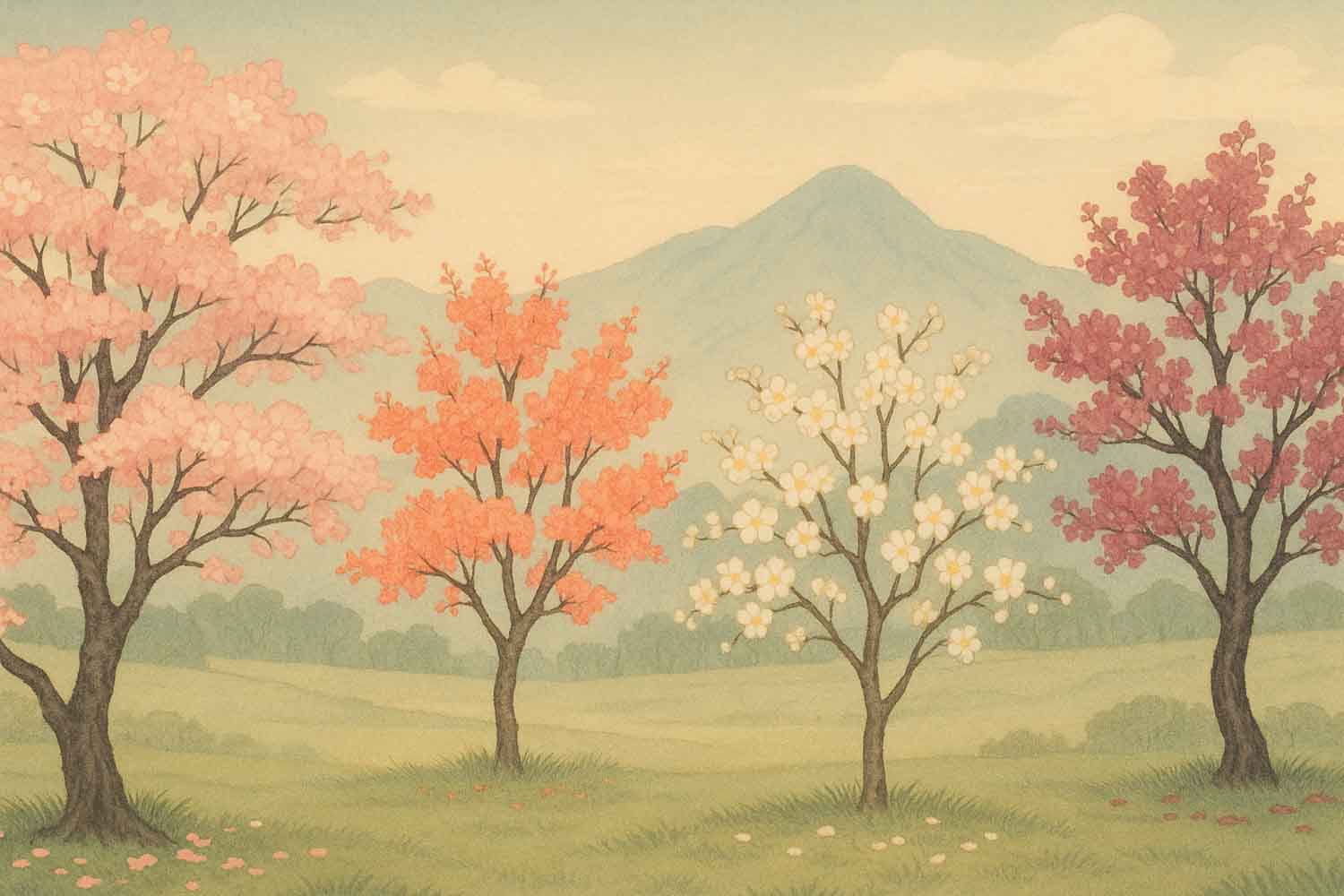Inspired by nature, the concept of oubaitori invites us to stop comparing ourselves to others, accepting that everyone blooms according to their own rhythm

Table of contents
Have you ever felt like you’re running late in life? Have you ever looked at others thinking you’ve fallen behind, as if you’re wasting time or missing opportunities? If the answer is yes, Japan has an ancient yet extraordinarily relevant concept that could change your perspective: oubaitori. Four flowers, four trees, four different times to bloom. No race, no comparison. Only uniqueness, acceptance, authenticity.
Oubaitori: the Japanese word that dismantles the logic of comparison
Oubaitori (桜梅桃李) is a word composed of four ideograms, each representing a flowering tree: sakura (cherry), ume (plum), momo (peach), and ri (apricot). All bloom in spring, but they do so at different times, with different colors, shapes, and fragrances. None rushes to surpass the other, none judges itself for blooming earlier or later. Yet, all make the landscape more beautiful.
In this, oubaitori reminds us that every person is like one of those flowers: they have their own timing, their season, their path. And there’s nothing wrong with not having arrived yet where others seem to already be.
In Japanese culture, this word is used to express respect for people’s natural rhythm. It’s an invitation to not judge yourself for what you haven’t yet accomplished, to not live in a hurry, and to recognize the value of your own story, even when it doesn’t match society’s expectations.
When judgment comes from those who love you (or from yourself)
It’s probably happened to you at least once in life: a Christmas dinner, a conversation at the table, the classic awkward question from a relative you see once a year:
“And the boyfriend/girlfriend?”
“And the degree/job?”
“When will you decide to start a family?”
Comparison is often disguised as affection or concern. But the subtext is clear: you’re running late, you’re doing something wrong, others have made it and you haven’t. That aunt, symbolic or real, ends up representing the judgmental voice that lives in many of us. A voice also fed by what we see every day on social media: perfect lives, happy couples, milestones reached in record time.
But the truth is different: that voice often lies. It lies when it tells you that happiness has an expiration date. It lies when it makes you believe that your worth depends on a list of goals completed by age thirty. And it lies when it makes you feel like a failure just because your blooming comes later.
Being late is just another form of blooming
We live in a system that teaches us from a young age that there are right ages for everything: graduate at 23, work by 25, marry by 30, have children before 35. Every deviation from this “roadmap” is read as a failure. Yet, real life is far more complex.
“If I don’t have a serious relationship yet, am I wrong?”
“If I don’t have a child at 40, have I wasted my time?”
“If I change careers at 50, have I failed?”
The answer is no. Take for example Andrea Camilleri, who published his first bestseller at 70. Or countless people who, after spending the first part of their lives satisfying external expectations, find only in mature age the strength to truly follow themselves.
Science confirms this too: those who marry later often have greater self-awareness, more stable relationships less influenced by social pressures. The point isn’t when you do things, but how authentic they are and aligned with who you are.
Comparing ourselves poisons us
According to research conducted by Florida House Experience, 27% of women compare themselves daily with others. And among teenage girls, this percentage reaches 88%. Social media plays a huge role: Instagram and TikTok show constructed, hyper-edited, idealized lives. Yet, the brain interprets them as reality.
However, comparison doesn’t stop at the body. It also poisons our life choices, our career ambitions, the time dedicated to relationships. In such a context, oubaitori becomes a true cultural antidote: it brings us back to nature, where no flower apologizes for blooming late, and no tree tries to imitate another to be accepted.
Living according to oubaitori
Adopting the principle of oubaitori in everyday life doesn’t mean moving to a Zen temple. It’s about small practices, simple but transformative:
- Keep a gratitude journal: focus on what’s already working, instead of chasing what’s missing.
- Curate your digital environment: silence social media accounts that trigger toxic comparisons.
- Modify your internal language: stop belittling yourself and start speaking to yourself with respect.
- Experience solitude as a resource, not as failure: a fertile space in which to reconnect with yourself.
And, above all, remember every day that there’s no “right” time to bloom. Your time is when you’re ready. And it doesn’t have to coincide with others’.
